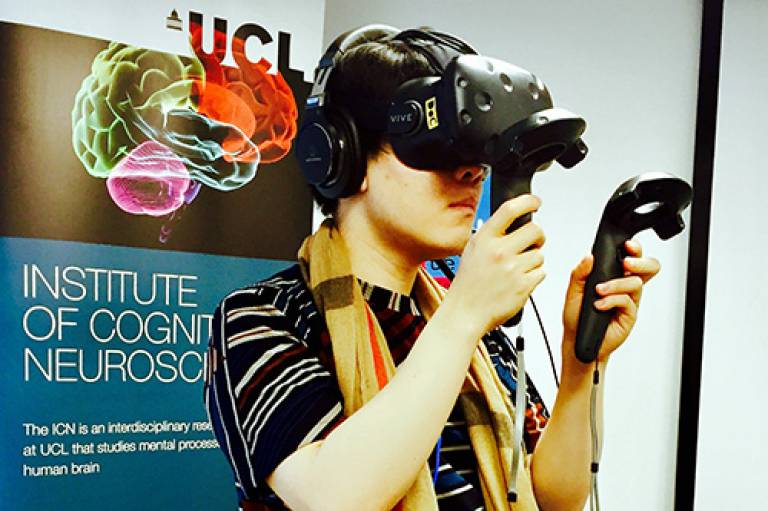Virtual Reality: the new cure?
31 May 2017
Virtual Reality (VR) has recently been established as a means of propelling gamers into an imaginary environment with realistic imagery and sounds - putting them at the centre of the game.
 As well
as gaming, VR technology is now being used in assisting therapy and recovery of
health related complications. Further work could also see VR being used for
diagnosis of particular diseases.
As well
as gaming, VR technology is now being used in assisting therapy and recovery of
health related complications. Further work could also see VR being used for
diagnosis of particular diseases.
The UCL Institute of Cognitive Neuroscience (UCL ICN), UCL Business and SoftV Digital Gamification came together last week to present the current progress of VR in health and further research in this field.
Spatial memory
After a warm welcome from Prof Geraint Rees (Dean of UCL Faculty of Life Sciences), Professor Neil Burgess explained how VR can be used to measure spatial memory in individuals. Spatial memory refers to the spatial information retained by the brain, such as the ability to remember geographical layout of a town or the interior layout of a house. The hippocampus is the part of the brain involved in spatial memory.
VR allows the vestibular and visual system to experience the same thing at the same time and so the activity of the brain can be manipulated. VR games therefore, can now be used to test for hippocampal damage, which could be an indication of dementia in patients.
SoftV Digital was formed in 2013, with UCLB being an investment partner - with an aim to create apps and services to benefit the wider public and patient community. Representatives from SoftV Digital explored the use of gaming as a method to combine both entertainment and science.
3D Tetris
One of the games presented was called BioBlox. It was developed to solve the issue of computers failing to efficiently predict protein docking sites. The game utilises the power of the human brain to recognise patterns in order to solve this problem. The game allows individuals to rotate protein molecules to fit into certain docking sites - a 3D version of Tetris.
Another game, Listen-in, was shown to be an educational platform for those with impaired speech comprehension after a stroke. Developed by Professor Alex Leff of UCL ICN, Listen-in allows individuals to listen to names of objects and then identify the item through pictures.
Dr Parashkev Nachev, from UCL Institute of Neurology, demonstrated how applying an eye tracker into mobile phone devices used for VR, can help to determine brain function of users when processing information. He emphasised how technology and health can now converge to become a powerful tool in future work.
With VR games, Apps and Augmented Reality on display, companies and academics welcomed individuals to test out their research.
Ayesha Khan, myUCL Student Journalist
 Close
Close

